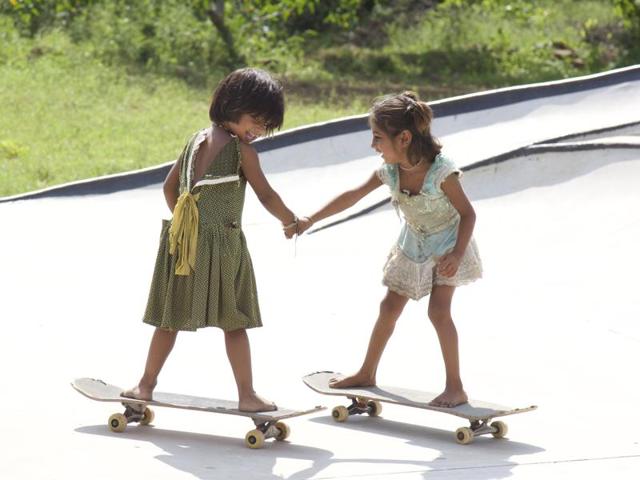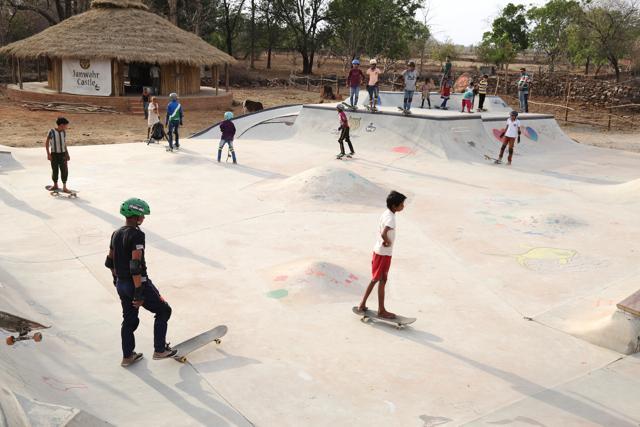Wheels up: Skateboards are bringing change to a tribal hamlet in MP
German activist Ulrike Reinhard‘s skateboarding park is getting kids from different castes, even boys and girls, to play together with respect.
What’s unfolding in Janwar, a dusty, tribal hamlet in Madhya Pradesh, would make for a compelling ‘before and after’ kind of meme.

Catalysing the change is a simple idea — a 4,843-sq-ft skatepark — and it’s bridging the caste divide, taking on gender stereotypes, even encouraging kids to go to school.
It’s been 18 months since the park was built by German community activist Ulrike Reinhard’s not-for-profit organisation, Janwaar Castle.
Read: This disabled couple spreads knowledge in MP’s tribal village
And now the skatepark has become the subject of a short film called The Barefoot Skateboarders, released by Mumbai-based youth content portal 101India last week.
Flipping skateboards in the air, popping their feet for a high jump and gliding down ramps, the documentary shows how the village’s Adivasi and upper caste Yadav and Kushwaha children play together, follow a ‘girls first’ rule, and have a ‘no school, no skateboarding’ policy that’s helping tackle truancy.
“Before the park came up, we were always asked to ‘stay away’ from the Yadavs,” says Arun Adivasi, 15. “But now we not only share our skateboards but also our earphones, chocolate, books and biscuits.”

From bunking school, gambling at card games and getting into brawls, Arun now attends class more regularly because of the no skateboarding rule for truants.
“At least 10 other children like Arun have stopped bunking school ever since this rule was framed,” says Avadh Dahayat, principal of Janwar’s only government school.
The caste divide, at least among the kids, is blurring, adds Janwar sarpanch Malti Adivasi. “If things continue at this pace then maybe kids from this generation will make Janwar the kind of place where Adivasis are not herded into one corner during weddings and asked to take water from the well only after everyone else is through.”
Why Janwar?
Reinhard, 55, first came to India four years ago and ‘fell in love’. She returned repeatedly, mainly to the world heritage site and temple town of Khajuraho, and on one of those trips, 35 km away, she discovered Janwar — a village of 1,200 people living in mud houses, with no toilets and power cuts that stretch for up to three days.
Most land is owned by the Yadavs; the Adivasis work as farm labour. Among both communities, alcoholism and gambling are rife. There’s only one school, and within it the children study and eat together, but outside, caste still determines where you live, what you do for a living, even whom can you play gilli-danda with.
Read: In 6 years, Madhya Pradesh saw 53,000 kids go missing
Reinhard thought it was just the place that would benefit from a project like Afghanistan’s Skateistan, where skateboarding is used as a medium to educate and empower girls.
“The idea first came to me in 2014, and by April 2015 the park was up and running, with the help of Skate-Aid, a German NGO, and 12 skateboarder volunteers from across seven countries,” says Reinhard, who now lives in nearby Panna and commutes the 26 km to Janwar on her Royal Enfield.

Funds were raised through a project that transformed skateboards into works of art. A total of 19 artboards were auctioned on eBay, and raised $16,000 (about Rs 10.6 lakh).
Among the 12 volunteers who help build the park was Bangalore boy Gautam Kamath.
“It was a great experience, helping build the park,” says the 29-year-old. “Knowing that the cement we were working on in a freezing winter was going to be a place where children, irrespective of religion, age or caste, would get together to skateboard.”
Making it work
Once the park opened, Reinhard encountered issues like men trying to drink, gamble and create a ruckus inside. “I simply ignored them,” Reinhard says. “Soon enough, their own children were asking them to back off, and they did.”
Entrusting children to make their own decisions is at the heart of Janwaar Castle’s philosophy.
“I really love working with young kids because their minds have not been trained or poisoned by preconceived notions. Even if that’s the case, it’s easier to reverse,” says Reinhard.

When the park first opened, for instance, curious Adivasi kids followed only a week after the other kids. They were still hesitant to try and share the boards, but it took very little for the divisions to melt away, at least within the park.
“One day we started by forming a circle and holding hands. There was an Adivasi girl in the circle and nobody wanted to take her hand. So I walked over and took one hand. A Yadav boy on the other side quickly took the other. The circle was closed. She was included,” Reinhard says.
Read: The wheels are turning- How Mumbai’s skateboarding scene took off
For some of the children, the park has also given them a confidence they didn’t know they could have.
Asha Adivasi, 16, says she had begun to face lewd comments if she left the house on her own, and was soon stepping out only for school. Then she started skateboarding. “As I kept getting better at my tricks, I started feeling more confident even outside the park. The village men don’t scare me anymore,” she says.
To boost that confidence, Reinhard has begun to give ‘her girls’ pivotal roles in the park and adjoining recreational space. Asha, for instance, has the keys to the 12 metal trunks that hold 20 skateboards, 6 Kindles, 4 tablet PCs and other study material.
As she talks to HT over the phone, impatient children can be heard calling to her. “I have to go,” she says, laughing, “I’m already five minutes late.”
Catch your daily dose of Fashion, Taylor Swift, Health, Festivals, Travel, Relationship, Recipe and all the other Latest Lifestyle News on Hindustan Times Website and APPs.



